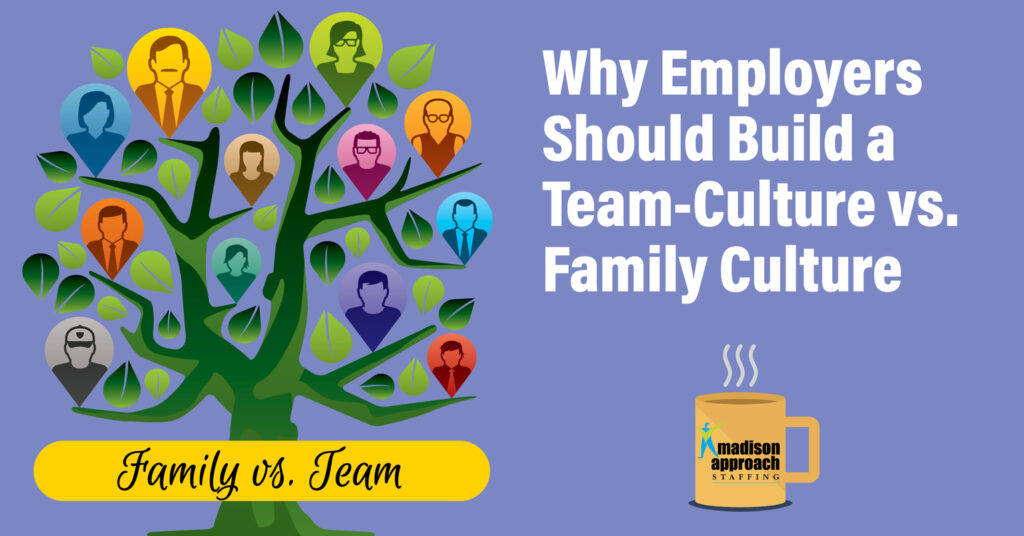Many employers like to brand their organizations as a “family” thinking it will help people feel like they belong and inspire loyalty. But it can backfire in the long run for many reasons. Here’s why building a high-performance team is a better business strategy than relying on the “We’re a Family” Cliche:
- Employees get paid to work: Creating a family atmosphere can be contradictory to a productive work environment. Employees need to understand that they are there primarily to work, and expectations, roles, compensation, and benefits should be clearly laid out in writing. Too much talk about being a “family” may create a culture that prioritizes socializing, rather than a work product.
- Who’s in Charge? In a family there are gender and generational roles like parents, grandparents, children, aunts, uncles etc. For example: the “office mom” typically becomes the person people confide in or complain to which feeds the gossip mill and undermines management’s authority. Additionally treating the young intern like a grandchild will make them uncomfortable and trivialize their contributions. Encouraging or ignoring these types of roles your staff may fall into, is not advisable in the workplace as it can cause DEI (Diversity, Equity, Inclusion) issues with Human Resources.
- Families don’t have policies and procedures: Imagine trying to get your “family” to conform to company policies and follow procedures. A company culture that is too relaxed makes it hard to enforce rules. Additionally, many people have unhealthy communication habits with their family members. A workplace needs to be one of respect and professionalism and employees need to function within those boundaries. It’s harder to set high expectations for conduct with constant talk of being a “family.”
- How to review or fire a family member: Your employees should have job descriptions and result metrics for which they are required to meet. If you must give your team member a negative review or reject them for a promotion, it becomes much harder if you sold them on being a “family.” Any type of reprimand will become an issue and cause resentment.
- Forced socialization: Being a family means inviting everyone to personal events outside of work, which can become a problem if people get left out. On the flip side, employees may feel pressured to socialize. Some people want to maintain their privacy and prefer the separation of work life vs. personal life.
- Overcompensating: Getting too involved in employee’s personal lives can fog up our objectivity. While it’s important to value staff as humans and have empathy, we need to be careful not to get too involved in employees lives and problems, which may cause us to make bad financial decisions when trying to help. Running your business for the sake of all employees (including yourself) is your number one responsibility.
- The family favorite: We are all human and tend to gravitate to those who are like us. However, in the workplace, playing favorites does more than just create animosity, it undermines the principle tenent of business—that successful outcomes are what’s important. It’s vital that employees be treated fairly for their work output and other predetermined results metrics.
- Employees Move on: The relationships employees build with their employers is transactional and most won’t stay at the same company for their entire career. If an employee decides to leave, it can make them feel trapped if you’ve built your company on the family-culture. Additionally, you may feel betrayed by those who choose to resign or, worse, keep unproductive employees.
Building a healthy, productive work culture takes a deliberate strategy and it’s important to build a team, not a family. Shift from focusing on a family-culture centered “we’re all in this together” to a team-culture “we share the same purpose.” Defining purpose leads to a heightened sense of loyalty and stronger employee engagement, especially when the company’s overlaps with the employee’s passions and purpose. Lead on!
Contact a talent coordinator at jobs@madisonapproach.com / 914-428-4800

